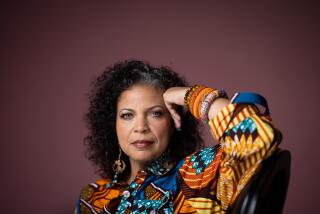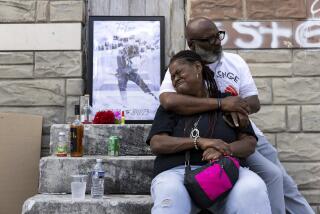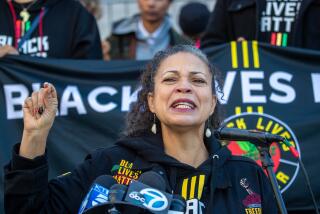Young Black Activist’s Blunt Tactics Draw Praise, Criticism
- Share via
Najee Ali, a brash, young community activist from South-Central Los Angeles, stepped into the national spotlight recently as the spokesman for Yolanda Manuel, whose 7-year-old daughter, Sherrice Iverson, was brutally murdered in a Nevada casino bathroom.
Ali was the impassioned voice at Manuel’s side when she reluctantly faced the news media. He accompanied her on camera during a handful of TV talk shows. He spearheaded a campaign to adopt a good Samaritan law in memory of the slain girl.
But two weeks ago at a news conference at Iverson’s grave, Ali abruptly turned on Manuel, accusing her of being only interested in a financial settlement with the casino.
It was a radical about-face, but dramatic turns are nothing new for Ali.
He is a former gang member and ex-convict who converted to Islam within the barren walls of a state penitentiary and now makes his living as a Muslim clergyman and counselor. After his release, he became an ardent voice against alcohol abuse, pornography and police discrimination in the black community. Along the way, he has taken shots at prominent black groups such as the Brotherhood Crusade and the NAACP, calling them unproductive and out of touch.
“We have some ineffective leaders in the black community and their methods are outdated,” he said. “We need a newer generation of leaders who are cutting edge.”
Cutting edge, to the 34-year-old Ali, means being out on the streets. As the founder of Project HOPE, a nonprofit organization, he seeks out gang members, feeds the homeless and counsels drug abusers.
His efforts have won the respect of many. But his comments about black leaders have antagonized others.
“Everybody who positions himself as an outspoken community activist isn’t necessarily a leader,” said Frank Berry, regional director for the National Assn. for the Advancement of Colored People, who said he has confronted Ali about his criticism of the NAACP.
“He has the potential,” said Kenneth Riley, president of the Los Angeles chapter of MAD DADS, an organization that seeks to reclaim communities plagued by drugs and gangs and to foster male responsibility. “But in order to be a leader you have to have a following.”
Ali said he was born in Gary, Ind., under the name Todd Eskew to a mother who worked as a prostitute and a father who was abusive.
His mother died when he was 12. Ali bounced from one relative to another until he came to South-Central to live with his grandmother. Like many youngsters in his neighborhood, he joined a gang and dropped out of high school at 17.
Back then, Ali said, his heroes were pimps and drug dealers. He said he routinely carried a gun and was in and out of jail until he was 28.
His arms are covered with scars: a bite mark from a police dog, a stab wound from a jailhouse brawl, a bullet wound that left a surgical scar that runs the length of his forearm.
At 23, he got a job as an equipment manager for the Los Angeles Clippers. But one day when Clipper Vice President Andy Roeser told Ali to leave a closed practice, Ali attacked Roeser on the court, breaking several ribs and puncturing a lung. The fact that he was never charged in the incident only encouraged further violent behavior, Ali said.
In 1990, police arrested Ali as he ran out of a Thrifty Drug store that he had just robbed. He served two years for armed robbery at Tehachapi State Prison.
While serving out a term in solitary confinement for fighting, Ali was handed the autobiography of Malcolm X, who converted to Islam and joined the separatist Black Muslim sect while in prison.
Ali said he had a similar religious awakening in his cramped cell.
“When I converted to Islam, I changed my name and my outlook.” He said his admiration of Malcolm X does not extend to racial separatism, which Malcolm X denounced during the last year of his life.
After Ali left prison, he became a clergyman and founded Project HOPE, which operates with an assistant out of the Bilal Islamic Center in South-Central and a small storefront in Leimert Park. He said he began his advocacy work by feeding the homeless on the same skid row sidewalk where he used to smoke crack cocaine.
“I think the brother is really sincere,” said Gregory Johnson, who met Ali about five years ago when they both lived on the streets. “His heart is in it.”
Ali’s work is funded by donations from the Islamic Center of Southern California and fees he earns as an AIDS prevention counselor. He is also a chaplain at Childrens Hospital of Los Angeles.
But he is best known for the demonstrations and protests he has led. Last year, he organized a protest against the sale and consumption of 40-ounce bottles of malt liquor in black communities. He and others demonstrated in front of the Magic Johnson Theater in the Crenshaw district, calling for the boycott of a movie by rapper Ice Cube, “The Players Club,” that Ali said demeaned African Americans. He also led a successful protest to keep a sex-oriented video store out of Leimert Park.
“There is no class called Community Activism 101,” he said. “Everything I’m doing is off of intuition.”
He acknowledges that his off-the-cuff comments have antagonized some people. But he said he is obliged to speak honestly about problems in the black community.
“I’m a former gang member,” he said. “I speak from the heart.”
That is what he was doing, he said, when he announced last month that he would no longer act as spokesman for Manuel, whose daughter Sherrice was strangled and sexually assaulted in a bathroom stall in a Nevada casino last year while her father played slot machines upstairs.
Ali met Manuel after he organized a candlelight vigil for Sherrice in Leimert Park in July in the wake of a detailed Times article about the killing and its aftermath that stirred fresh outrage over the case. Ali felt sympathetic toward the mother, he said, because he has a daughter who is a few years older than Sherrice.
Sherrice’s killer, Long Beach teenager Jeremy Strohmeyer, pleaded guilty last month to kidnapping, sexual assault and murder. His sentencing is set Oct. 14.
Ali spoke on Manuel’s behalf and appeared at her side on such TV talk shows as “Leeza,” “Prime Time Justice” and “Cochran & Company,” hosted by attorney Johnnie Cochran.
Most of Ali’s work has focused on pressuring officials to punish Strohmeyer’s friend, David Cash, who told The Times and police that he saw Strohmeyer struggle with Sherrice in the bathroom and later heard him confess, but kept silent.
Cash has not been charged because Nevada has no law requiring crime witnesses to come forward.
Undeterred, Ali led a campaign that collected 20,000 signatures on petitions urging Nevada prosecutors to charge Cash as an accessory. Ali also accompanied Manuel to a demonstration at UC Berkeley to demand that Cash be expelled for his role in the killing and his statements of indifference toward Sherrice.
The news conferences and demonstrations may have paid off: Lawmakers in California, Nevada and Texas have proposed good Samaritan laws that would make it a crime to witness an assault against a minor and not intercede.
Ali describes his work on Manuel’s behalf as “brilliant,” claiming: “I brought Sherrice Iverson back to life.”
But on Sept. 17--just nine days after Strohmeyer pleaded guilty--Ali held a news conference at Sherrice’s graveside to attack Manuel. “Yolanda wants to make money off her child’s death,” he claimed. He also suggested that authorities prosecute Sherrice’s father, Leroy Iverson, for child neglect for leaving Sherrice unsupervised in the casino.
Manuel and Iverson, who never married and were separated at the time of the killing, have each filed wrongful death lawsuits against the casino, now known as the Primm Valley Resort & Casino.
Ali said he criticized Manuel because she broke her promise that she would speak out against Leroy Iverson once the murder trial was over. Ali said he suspects Manuel is keeping quiet to improve her chances of winning a settlement with the casino.
Privately, several black leaders criticized Ali for attacking the slain girl’s mother. Manuel refused to comment beyond previous statements that Ali betrayed her, and that she is not motivated by money. Her lawyer, Steve Lerman, called Ali a “fraud.” He said Manuel actually dismissed Ali as her spokesman before he quit.
Responded Ali: “Steve Lerman is just jealous and upset.”
More to Read
Sign up for Essential California
The most important California stories and recommendations in your inbox every morning.
You may occasionally receive promotional content from the Los Angeles Times.














